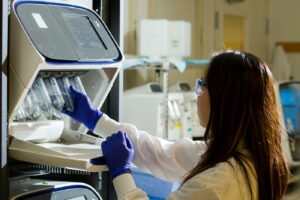
In a world characterized by constant change and innovation, the healthcare industry is no exception. Healthcare innovations are rapidly reshaping the landscape of medicine, offering new possibilities and opportunities for both patients and healthcare providers. In this blog post, we will explore how these innovations are transforming the future of medicine and what it means for all of us.
I. The Impact of Healthcare Innovations
Healthcare innovations are not just a passing trend; they are pivotal to the advancement of medicine. Throughout history, we’ve witnessed significant breakthroughs, from the discovery of antibiotics to the development of vaccines. However, the pace of innovation has accelerated in recent years.
Today, healthcare innovations have a profound impact on society, improving patient outcomes, reducing costs, and enhancing the overall healthcare experience. According to recent statistics, the global digital health market is expected to reach $379 billion by 2024, underscoring the significant growth in healthcare technology.
II. Key Trends in Healthcare Innovation
Subheading: Telemedicine Revolution
Telemedicine has emerged as a game-changer in healthcare. It enables remote consultations, diagnosis, and treatment, making healthcare accessible to individuals regardless of their location. This innovation gained even more prominence during the COVID-19 pandemic when social distancing measures were enforced.
Telemedicine offers several benefits, such as convenience, reduced wait times, and expanded access to specialist care. Real-life examples, like the success of virtual doctor visits and teletherapy, demonstrate its effectiveness.
Subheading: Artificial Intelligence in Diagnostics
Artificial intelligence (AI) is revolutionizing medical diagnostics. AI-powered algorithms analyze vast datasets, aiding physicians in making accurate and timely diagnoses. In radiology, AI can detect anomalies in medical images with remarkable precision, expediting diagnosis and treatment.
Wearable Health Tech*
Wearable devices, from fitness trackers to smartwatches, play a crucial role in monitoring personal health. They provide real-time data on vital signs, activity levels, and sleep patterns. These devices empower individuals to take control of their well-being and facilitate preventive healthcare.
III. Personalized Medicine and Genomics
Personalized medicine tailors medical treatments to an individual’s genetic makeup. Genomics, the study of an individual’s genes, is a key driver of personalized medicine. By understanding a patient’s genetic profile, healthcare providers can prescribe treatments that are more effective and have fewer side effects.
The success stories of personalized medicine, such as targeted cancer therapies, highlight its potential to revolutionize patient care.
IV. The Role of Big Data in Healthcare
Big data is a cornerstone of modern healthcare. The collection and analysis of vast amounts of health-related data offer insights that were previously unimaginable. Predictive analytics can identify disease trends and enable early intervention.
The integration of electronic health records (EHRs) and data from wearable devices provides a comprehensive view of a patient’s health, enhancing the quality of care.
V. Telehealth and Remote Monitoring
Subheading: Remote Patient Monitoring
Remote patient monitoring enables healthcare providers to keep tabs on patients’ health remotely. Devices such as blood pressure monitors and glucose meters transmit data to healthcare professionals in real time. This proactive approach to care allows for early intervention and reduces hospital readmissions.
Subheading: Telehealth Beyond Consultations
Telehealth extends beyond virtual doctor visits. Innovations like remote surgery and virtual reality therapy are gaining momentum. These technologies hold the promise of expanding the scope of healthcare services and improving patient outcomes.
VI. Challenges and Concerns
While healthcare innovations offer immense promise, they also come with challenges. Ethical concerns regarding patient privacy and data security must be addressed. Regulatory hurdles can slow down the adoption of new technologies. Additionally, the digital divide must be bridged to ensure equal access to healthcare innovations for all.
VII. The Future of Healthcare: Predictions and Possibilities
The future of healthcare is bright, filled with exciting possibilities. Experts predict that innovations in AI, genomics, and telemedicine will continue to shape the industry. From personalized treatment plans to AI-driven drug discovery, the potential for positive change is immense.
Takeaway
Healthcare innovations are not just changing the future of medicine; they are defining it. The impact of telemedicine, AI diagnostics, genomics, and big data is undeniable. As these innovations continue to evolve, they will revolutionize patient care, improve outcomes, and make healthcare more accessible to all.


